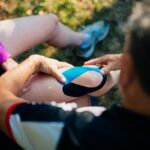Joint pain and discomfort can disrupt your daily activities and affect your quality of life. An orthopedic doctor is a medical specialist who focuses on the musculoskeletal system, which includes your bones, joints, ligaments, tendons, and muscles. They diagnose and treat a range of conditions affecting this system. Here is some information about the role of an orthopedic doctor in joint health:
Evaluates Symptoms For Accurate Diagnoses
During your visit, your orthopedic doctor typically asks detailed questions about your symptoms, focusing on when they started, how they feel throughout the day, and what worsens or improves discomfort. This offers clues about what might be contributing to your joint pain. The doctor also reviews your medical history for relevant conditions or injuries that could affect joint health.
A physical examination is a practical way for the doctor to assess your movement, joint alignment, and any swelling, redness, or tenderness. By observing how you walk or perform certain movements, the doctor seeks to understand how your daily life is impacted. Imaging studies, such as X-rays, MRI scans, or CT scans, may be ordered. These tools provide detailed pictures that help identify injuries or structural issues that are not visible externally. Bloodwork or joint fluid analysis can be used to rule out infections or inflammatory conditions like rheumatoid arthritis or gout. These approaches provide a clearer view of what is happening inside your joint and why you are experiencing discomfort.
Offers Surgical and Non-Surgical Treatments
Your orthopedic doctor will discuss treatment options that address the cause of joint discomfort, as determined through testing. Some joint and musculoskeletal problems can be treated effectively without surgery, but others require surgical intervention. Potential treatment options include:
- Medications: Oral medications or topical creams may be prescribed to manage pain and reduce inflammation.
- Injections: For severe symptoms, injections like corticosteroid shots or hyaluronic acid can provide targeted relief directly to the affected area.
- Physical therapy: Therapists work with your doctor to create personalized exercise programs to improve strength, flexibility, balance, and movement.
- Lifestyle adjustments: Changes such as weight management or improving workplace ergonomics can reduce stress on your joints and aid recovery.
- Arthroscopy: This surgery repairs torn cartilage or ligaments.
- Joint realignment: These procedures correct structural issues.
- Joint replacement: Dysfunctional joints, such as the hips, knees, or shoulders, may need to be replaced to restore movement.
Supports Rehabilitation and Injury Prevention
Rehabilitation plays a central role in your overall recovery and future joint health. Orthopedic doctors and physical therapists form a team dedicated to guiding you through each step of rehabilitation. They track your progress and make regular adjustments to your therapy plan. This helps build strength and flexibility over time without straining impacted joints.
Preventing future injuries is a priority. Your doctor provides advice on daily habits that contribute to joint protection, such as using proper lifting techniques, warming up before physical activity, and choosing supportive footwear. They might recommend specific strengthening exercises for muscles surrounding your joints, as strong muscles serve as natural stabilizers. Education about posture, balance, and activity modification helps you make informed choices and reduce your risk of re-injury.
Work With an Orthopedic Doctor
An orthopedic doctor is a dedicated partner in helping you address joint issues, from accurate evaluation through tailored treatment and recovery. With a focus on evidence-based approaches, these specialists address bone, muscle, and joint conditions using their training and experience. They are equipped to guide you through both surgical and non-surgical paths, always aiming to restore comfort. If you have persistent joint pain or a recent musculoskeletal injury, contact an orthopedic doctor today to schedule an assessment.





